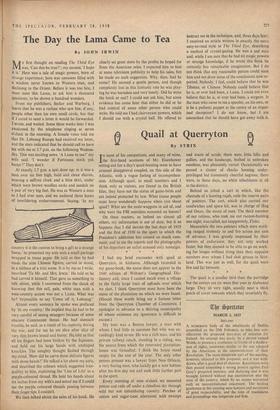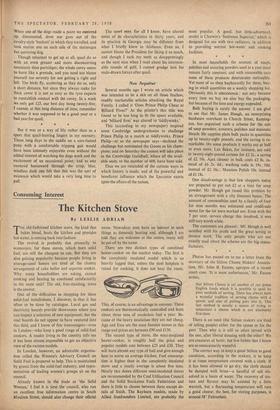Quail at Querryton
By STRIX
IN most of his compatriots, and many of mine, the first-hand accounts of Mr. Eisenhower setting out for a day's quail-hunting seem to have aroused disapproval coupled, on this side of the Atlantic, with a vague feeling of incomprehen- sion. Although quail, in small numbers and I think only as visitors, are found in the British Isles, they have not the status of game-birds and are indeed protected by law. What (some people must have wondered) happens when you shoot quail? What are the mule-waggons in aid of, and why were the FBI outriders mounted on horses? On these matters, as indeed on almost all others, my information is out of date; but it so happens that I did devote the last days of 1929 and the first of 1930 to the sport to which the President's addiction has caused so much com- ment, and in me the reports and the photographs of his departure on safari aroused only nostalgia.
I had my brief encounter with quail at Querryton, in Alabama. Although recorded in my game-book, the name does not appear in the 1949 edition of Webster's Geographical Dic- tionary and, since I cannot recall even a village in the fairly large tract of uplands over which we shot, I think Querryton must have been the name of the plantation on which we were based. (Should these words bring me a furious letter from the Querryton Chamber of Commerce, I apologise in advance to a thriving municipality of whose existence my ignorance is difficult to excuse.) My host was a Boston lawyer, a man with whom I had little in common but who was ex- ceedingly kind to me. He was a rich man, and his private railway coach, standing in a siding, was the source from which the renovated plantation- house was victualled; I think the house stood empty for the rest of the year. The only other person present was a lawyer from New Orleans, a very boring man, who luckily got a sore bottom after his first day out and took little further part in the sport.
Every morning at nine o'clock we mounted ponies and rode off under a cloudless sky through wild but not intimidating country. Patches of cotton and sugar-cane alternated with swamps and tracts of scrub; there were little hills and gullies, and the landscape, bathed in unbroken sunshine, was pleasantly varied. Occasionally we passed a cluster of shacks housing under- privileged but immensely cheerful negroes; there were, in those days, no white inhabitants at all in the district.
Behind us jolted a cart in which, like the cheetahs of a hunting rajah, rode the reserve pairs of pointers. The cart, which also carried our sandwiches and spare kit, was in charge of Hog and Oscar, the nicest of men. The third member of our retinue, who took me out racoon-hunting one night, was called, not inappositely, Fluke.
Meanwhile the two pointers which were work- ing ranged tirelessly to and fro across our axis of advance. I was greatly impressed by their powers of endurance; they not only worked faster, but they seemed to be able to go on work- ing for longer without tiring than their opposite numbers over whom I had shot grouse in Scot- land. This was just as well, for the quail were few and far between.
* * * The quail is a smaller bird than the partridge but the coveys are (or were that year in Alabama) large. They sit very tight, usually near a thick patch of cover towards which they invariably fly. When one of the dogs made a point we cantered up, dismounted, drew our guns out of the cavalry-style 'buckets' in which they travelled, and took station one on each side of the statuesque but quivering dog.
Though reluctant to get up at all, quail do so with an even greater and more disconcerting unanimity than partridges; the whole covey seems to burst like a grenade, and you need not blame Yourself too severely for not getting a right and left. The birds fly, scattering as they do so, only a short distance, but since they always make for thick cover it is not as easy as the tyro expects to reestablish contact with the covey. In a week we only got 123, our best day being twenty-five; I cannot, at this long distance of time, remember whether it was supposed to be a good year or a bad year for quail.
* * *
But it was as a way of life rather than as a sport that quail-hunting lingers in my memory. Those long days in the saddle on a sure-footed pony with a comfortable tripping gait would have been intensely enjoyable even without the added interest of watching the dogs work and the excitement of an occasional point; and as one cantered homeward through the crisp, blue, windless dusk one felt that this was the sort of existence which would take a very long time to pall. The sport may, for all I know, have altered some of its characteristics in thirty years, and its practice in Georgia may be different from what I briefly knew in Alabama. Even so, I cannot blame the President for liking it so much, and though I suck my teeth as disapprovingly as the next man when I read about his intermin- able rounds of golf, I cannot grudge him his mule-drawn forays after quail.
Non Sequitur Several months ago I wrote an article which was intended to be a skit on all those fearless, readily marketable articles attacking the Royal Family. I called it 'Does Prince Philip Cheat at Billiard Fives?' At the printer's this title was found to be too long to fit the space available, and 'billiard fives' was altered to 'tiddlywinks.'
This (according to my newspaper) inspired some Cambridge undergraduates to challenge Prince Philip to a match at tiddlywinks. Prince Philip—or. so the newspaper says—declined the, challenge but nominated the Goons as his cham- pions; and on Saturday the contest will take place in the Cambridge Guildhall, where all the avail- able seats, to the number of 600, have been sold.
Thus we are reminded of the curious ways in which history is made, and of the powerful and beneficent influence which the Spectator exerts upon the affairs of the nation.



































 Previous page
Previous page